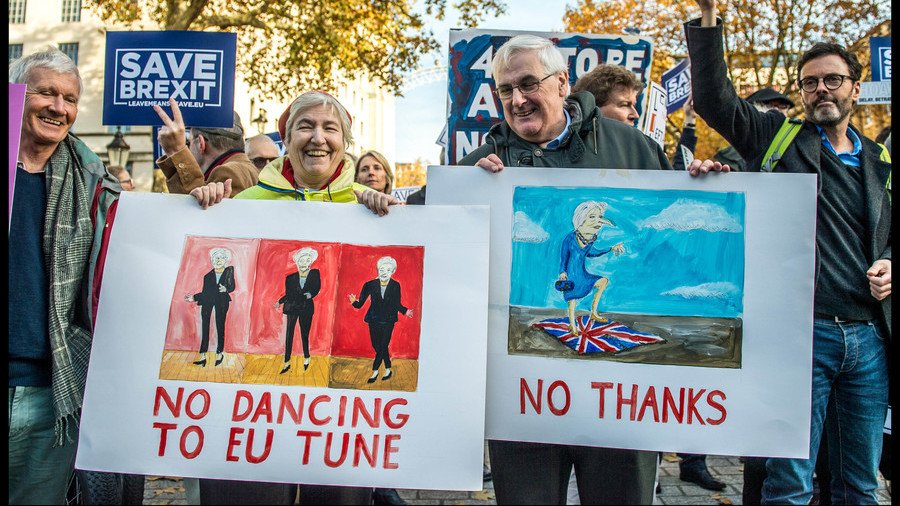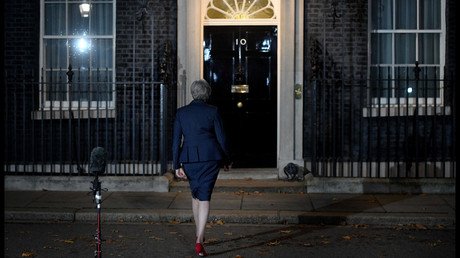How Brexit debacle is uncovering and unraveling the dis-United Kingdom

You have to hand it to Britain's Theresa May. She certainly possesses doughty British stiff-upper-lip attitude in the midst of gloom. Still, despite her assertion "the best days are ahead of us" the outlook doesn't bode well.
At best, the United Kingdom is heading into years of yet more political turmoil and acrimony, which will sap society, the economy and governing authority. At worst, the stresses and strains over the Brexit divorce from Europe could see the four-nation family splitting up in a constitutional crisis.
We should remember that while parts of Britain's cultural history do indeed have a long and eminent past, the Magna Carta for example in 1215 establishing individual legal and political rights, the present construct of the 'United Kingdom of Great Britain and Northern Ireland' is less than 100 years old. The UK as we know it resulted from when the rest of Ireland broke away with separate nation status after a war of independence (1919-21).
Arguably, the UK is a rather shaky amalgam of England, Wales, Scotland and Northern Ireland. The latter region saw a 30-year conflict (1968-98) with tens of thousands of British troops having to occupy the region to maintain a semblance of order.
Scotland and Wales both have separatist movements, with the Scots vowing to hold a second referendum on whether to declare independence from the central government in London.
The testimony to Britain's fragile constitutional configuration is the issue of an Irish border upon which the whole Brexit process has floundered. London's inability to negotiate a smooth divorce from the 28-member European Union was because of the political and constitutional morass created by Britain's territorial claim to Northern Ireland. Most people on the island of Ireland do not want a hard border from Brexit. Neither did the rest of the EU.
That meant the British government having to come up with the present draft Brexit plan which keeps the UK within the EU trading zone in order to avoid the border issue in Ireland.
That's why the Brexiteers within the ruling Conservative Party are threatening to topple Theresa May's leadership. They view her draft deal as a betrayal of the June 2016 referendum result to leave the EU because the fuzziness over Ireland is, to them, an erosion of British territorial integrity. But what is British territorial integrity?
A large constituency of the British population who want to remain with the EU are not happy either. They see May's proposed deal as "half-baked" and a "half-way house" that is neither out nor in.
Pro-independence Scottish voters have also taken note of the anomalies with regard to Ireland. With fair reasoning, the Scots are saying if Northern Ireland is given exceptional status, as being sort of still in the EU to avoid the border problem, then they also demand exceptions. It should be noted that in the 2016 referendum majorities in Scotland and Northern Ireland voted in favor of remaining part of the EU.
The trouble with Brexit is that it reflects the deep divisions inherent in the United Kingdom. Those divisions in its regions were arguably always there, but were papered over with a contrived veneer of unity.
Brexit was essentially an English impetus, especially among those nationalistic "little Englanders" among the Conservative Party who harbored dreams of returning Britain to its former rule-Britannia-glory when a quarter of the earth's land mass was under the empire.
For almost 40 years of its membership in the EU, the British Conservative Party has been in a state of civil war between the Euroskeptics and those willing to be part of a European bloc. The Brexit referendum was granted by former Tory leader David Cameron largely to placate the Eurosceptics within his party. What most people did not anticipate was the leave vote winning the referendum.
It may be speculated that a crucial component of the leave vote was driven by a protest against the authorities both in Britain and Brussels, not so much over EU membership per se. It was a protest more generally over grievances about economic austerity and lack of democratic representation.
In other words, the English neo-imperial brigade of the Tory party just got lucky by being able to tap into a wider groundswell of popular discontent.
A problem then ensued whereby Britain found itself on the road to divorce from the EU but there was never a consensus about what acceptable divorce terms would look like. Nearly half of the voting population never wanted divorce anyway.
That's why May's government has had an impossible task of negotiating the separation arrangement. How can London come to terms when the whole United Kingdom is so fragmented on the issue? Theresa May herself was for remaining in the EU. Yet she is leading a government negotiating Brexit. There is bound to be conflict of interest and conviction, which manifests as classic British muddling through a crisis.
May is in an unenviable position. She is tasked with delivering an impossible compromise between irreconcilable factions, both within her own party, the House of Parliament and across the entire country.
After two years of grinding negotiations between London and Brussels, the future for Britain looks even more uncertain and fraught. The knives are out among her own backbenchers in parliament despite referring to her as "my honorable friend." May might just survive a leadership challenge, partly because Brexiteers like Boris Johnson and Jacob Rees-Mogg don't seem to have the stomach to take up the poison chalice.
May's best bet perhaps is to get the British parliament to hold its nose and vote for her Brexit deal because the alternative of crashing out of the EU in March next year would be too catastrophic for the economy and society to contemplate. Confronted with a cliff-edge scenario, British lawmakers from within her party and the various opposition parties might just back her plans for Brexit.
In best British tradition, the country will soldier on with a plan which few wholeheartedly support. The transition to exit the EU could go on for years, arguing about this or that. That withering process will only lead to further alienation among ordinary Brits towards the political establishment and governing institutions.
But the rancour will also impel more strident debate in the regions of Scotland, Wales and Northern Ireland about the validity of the construct known as the United Kingdom.
Already the Brexit debacle has made it abundantly clear that the whole of Ireland would be better off as a unified state, independent from Britain. The contortions over the Irish border demonstrate that London's territorial claim over Northern Ireland is dubious and in contravention to natural justice owed to the Irish.
It seems only a matter of time until the various regions currently comprising Britain begin to realize their governance is best delivered away from London's control.
Here's the irony. Brexit may have been inspired by English nostalgia for reclaiming former imperial, buccaneering glory. But by trying to turn the clock back to some imagined former greatness, the Brexiteers end up unravelling the United Kingdom.
Think your friends would be interested? Share this story!
The statements, views and opinions expressed in this column are solely those of the author and do not necessarily represent those of RT.


















